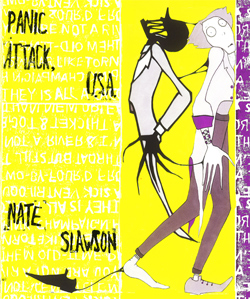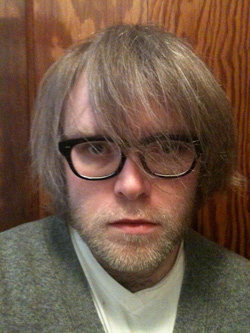
First Book Questionnaire: Nate Slawson | August 17, 2012.
1. Does your manuscript bear any relation to a graduate thesis project?
Some poems (10–20%) are like third cousins to a little of what I worked on toward the end of grad school, but as a whole or in clusters, no.
2. How do you feel about these poems now that they’ve materialized in book format?
My poems embarrass me, either quickly or over time. I do feel the poems and book are a solid, cohesive whole. And it’s a strange dichotomy of feelings, because I’m more than pleased with the book. But I also feel I can do better. I can always do better.
3. What was your experience when you began publishing? What challenges did you encounter?
I didn’t try publishing anything until I was around 30 (as I write this, I am a newly-minted 35). And when I did start sending poems around, I didn’t send a lot. I picked places I knew and liked, and that seemed to be a good route to go.
As far as challenges (aside from being late to the poetry and publishing world), I don’t like to be referred to in a shitty form rejection as “Dear Writer” or “Dear Submitter.” The whole process of submitting bores me to the point where I don’t send anything anywhere for months and months. So I guess one challenge is finding publications that I’m excited about and who will be (hopefully) excited about my work. Because you never really know. And I’m not someone who cares one bit about publication for publication’s sake.
4. How, if at all, did chapbooks prepare you for the making of a full-length collection?
Piecing together a chap—a good, solid chap—is a difficult task. The best chapbooks out there are tighter than any full-length collections. You can see/feel the movement in a chapbook much easier than in a full-length, and this is important because movement and shape are more about feel than any type of logic.
5. How did you shape and order your manuscript?
Trial and error. Over and over. Katherine Sullivan, my editor and publisher at YesYes, was amazing. We were always on the same frequency. I would put the book (or a part of the book) together in whatever way, even though I felt something was off. I had my suspicions of what was off, and Katherine always knew what it was. We agreed roughly 95% of the time on ordering and sections (along with re-titling and edits and other types of shuffling).
6. Was anyone or anything indispensable in the process of making your debut collection?
All the people who read the book in its various forms. The people I love. The people whose words and work I respect so much that I couldn’t abandon the book even though I more or less did a couple of times. The book is their book.
All the books and writers and movies and records I adore are always with me. I am in debt to the world that surrounds me.
7. What is your impression of book contests?
A lot of books I love were published through book contests. That’s not to say that all contests or presses are equal, but too many people complain about contests. Personally, I don’t send to contests. But I’m not opposed to them. Simply: I’d rather spend $25 on a couple of books or records than on someone reading my poems. I mean, since I’ve been publishing, I’ve either been in grad school, unemployed, and a part-time lecturer. And with any little bit of spending money I have, I’d rather buy books than pay someone to read my non-book.
8. How did you learn to navigate the press world?
I don’t know if I have learned to navigate the press world. Maybe I have, and what I’ve learned is that the press world (indie presses, yes?) is made up of many tiny worlds, many of which overlap in one way or another. And to be a part of the world means to be a good citizen. Buy books, share them with your friends, reach out to writers and editors and tell them you love them if you do genuinely love them.
9. What aspirations did you have for this book?
Just one, really: for it to be read by as many people as possible. That’s what it’s there for. My hope (and I have heard this hope fulfilled by a few people at readings) is to connect with folks who don’t usually go for or “get” poetry. I suppose that’s two aspirations, but they go hand-in-hand.
10. How would you describe this work?
I’m awful at describing my own work. My standard-ish response about my work in general is that I write little story-poems, poems that contain a narrative of oscillation. Every poem(?) is also a love poem in the way that every Jawbreaker song is a love song. In a visit to one of Matt Hart’s classes last fall, we decided I am an emo poet. I said it first to make his students laugh, but Matt said “you are an emo poet.” But let’s classify this: emo Jets to Brazil, not emo Fall Out Boy.
11. Do you work primarily on discrete poems, serially, toward a project, with a set of concerns, or otherwise?
Almost exclusively toward a project and/or serially. I suppose it’s the way I function. These are also the books I’m most drawn to. I love a great stand-alone poem, but I see patterns and narratives (however fractured sometimes) everywhere I look.
12. Whose poems affect you or your work?
Every poet who affects me affects my work. Over the past few years, the list is long. But at the top of that list are Frank O’Hara, John Berryman, Emily Dickinson, Matthea Harvey, Emily Kendal Frey, Matt Hart, Alex Lemon, Joshua Marie Wilkinson, and Brian Henry.
The first three are love and life laid bare and essential to my core. The second three have a way of saying things (sadness and gladness and madness) I feel in my heart-brain. And the final three, who I re-read incessantly, are the 21st century high priests of precision and non-wasted words.
13. What are you working on now?
As always I have a few projects going on. There will be some poems out soon here and there from what I consider the sequel to Panic Attack, USA. I’m actually working on a trilogy, though. The work is different in each book, not just PA, USA poems over and over. I suppose it can be loosely defined as a suburban trilogy. As a matter of fact, there’s a completed chapbook that will be released by YesYes (I can only say so much about this) that is its own stand-alone object. So I guess what I’m working on is a trilogy and a half? A misshapen tetralogy? Labels. Whatever.
